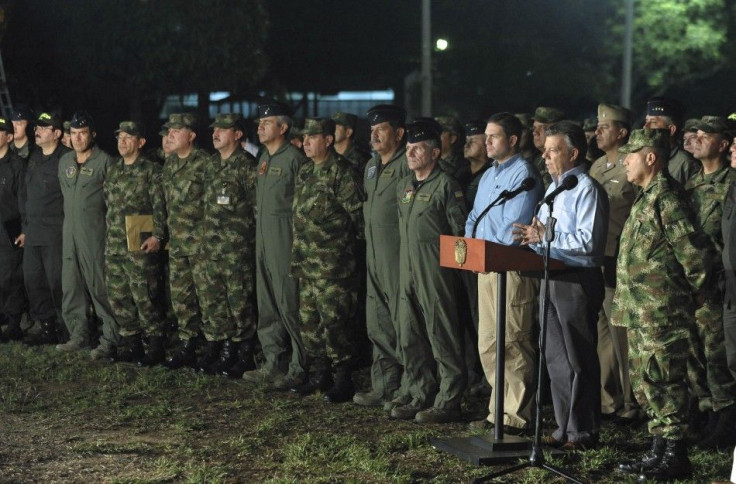Conflict Flares In Colombia After FARC's Cease-fire Ends

Colombia’s largest rebel group, Revolutionary Armed Forces of Colombia, better known as FARC, has launched a series of attacks against government and energy infrastructure targets after declaring the end of its two-month unilateral cease-fire with the government over the weekend.
On Sunday, the leftist rebels attacked an army outpost in the Hacari municipality, located in the northern department of Norte de Santander near the border with Venezuela, leaving four soldiers wounded, according to military officials.
In the same department, in the municipality of Tarra, rebels attacked a group of arm soldiers, killing a non-commissioned officer, marking the first casualty since the cease-fire ended and signaling a full-fledged renewal of hostilities amid peace talks to end nearly five decades of armed conflict between the two sides.
"With pain in my heart, we have to admit that we return to the stage of war that nobody wants," FARC chief negotiator Ivan Marquez told reporters while in the Cuban capital, Havana, for peace talks, according to the BBC.
FARC rebels have also attacked a police station and destroyed electricity towers and an oil pipeline in other parts of the country.
Colombia’s President Juan Manuel Santos responded to the first round of attacks on Sunday, vowing to take immediate action against the rebels.
"We are on the offensive,” he said in a press conference, according to Colombia Reports. “We had an open discussion and I received a lot of intelligence information about suspected operations of this organization had planned and is planning after this moment [and we are] taking all the precautions, all the measures to make sure these actions are neutralized.”
FARC announced the cease-fire last November, but the government refused to observe it, believing that the rebels would use the period to re-arm and rebuild their ranks.
The government has been skeptical of calls for an armistice since a previous administration established a demilitarized zone in rebel territory in 2002, which FARC used to re-group and plan more attacks against the state.
The rebels claim to have around 18,000 members, while the government estimates its numbers are closer to 8,000.
Negotiations between the two sides began in Oslo in October and have continued in Havana.
The government has demanded that the group disarm before it considers a cease-fire, while rebels have refused to concede on this.
Negotiations are currently centered on the issue of land reform. Roughly a quarter of Colombia’s population lives in rural poverty, according to the U.N. International Fund for Agricultural Development.
“Unequal distribution of wealth is a major issue in rural Colombia, where large landholders control vast areas of underutilized land,” IFAD said on its website. “The loss or lack of land is one of the main causes of poverty in the country.”
FARC took up arms against the government in 1964, seeking to establish a Marxist state while demanding economic and social justice for the country’s poor, but has engaged in kidnappings and drug trafficking to fund its operations.
© Copyright IBTimes 2024. All rights reserved.











